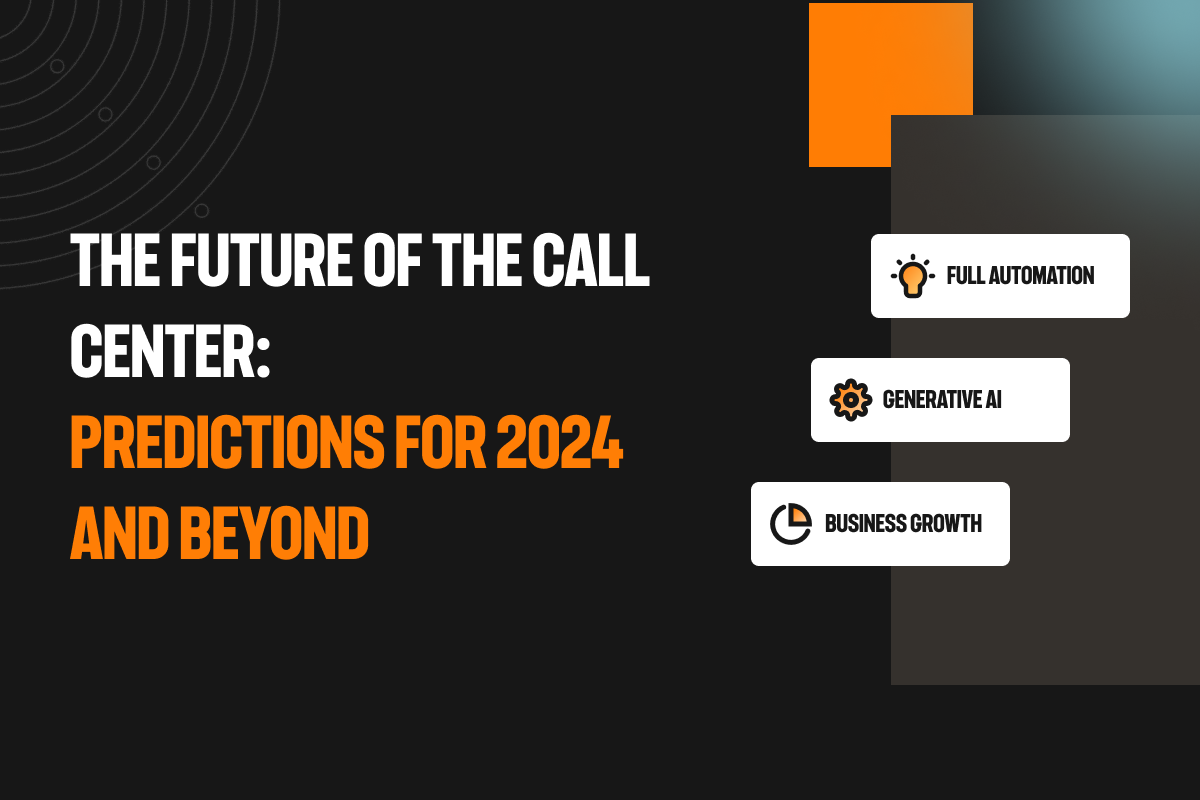How To Achieve Revenue Growth By Using AI Solutions at the Contact Center


Contact centers, also referred to as call centers, are traditionally meant to provide support to customers and handle their complaints, inquiries, or requests. A call center is often associated with controlling costs relating to customer churn, and supporting business operations rather than directly generating revenue. Contact centers have a mission to deliver excellent customer experiences as often as possible, and modern contact centers are increasingly able to do this through the power of artificial intelligence.
Once an exceptional customer experience is unlocked through Artificial Intelligence, two things happen: customer retention increases, and upsell opportunities emerge. These two components, coupled with other operational efficiencies gained, can significantly accelerate call center ROI.
For most businesses, the cost of running a call center, including efficiency and cost-reduction tactics like interactive voice response (IVR), predictive analytics, and quality assurance (QA), are considered an overhead cost necessary to maintain the operations of the business. Artificial Intelligence tools– such as Level AI solutions– are now also helping contact centers drive revenue growth.
AI tools are the critical divergence between cost-driven and revenue-generating call centers– by empowering agents through real-time assistance, dynamic agent coaching, upselling recommendations, and data-driven QA and analytics.
Switching from Reactive to Proactive Customer Interactions
Traditional call center models are primarily reactive. A customer calls in, and the agent tries to react as best as possible to the situation. Despite numerous playbooks and agent coaching programs, most agents in such scenarios are usually left to their best judgment. The result is lower customer satisfaction (CSAT) scores, increased escalations, and customer churn issues.
This approach becomes ineffective in the face of the following stats from surveys done by HubSpot, Salesforce, and Replicant:
- 91% of consumers reported poor customer service.
- 88% feel the experience a company provides is as important as its product or services
- 96% of consumers say excellent customer service builds trust
- 94% of customers say positive service experiences make them more likely to purchase again
- 90% say an immediate response is critical when they have a customer service question
- 83% of people prefer to speak to just one person to resolve any complex customer issue
- 48% of consumers switched brands due to better customer service by the other company
(*Survey year data 2021)
AI tools turn this scenario on its head, flipping the agent’s response from reactive to proactive.
Artificial Intelligence tools, such as Level AI solutions, can provide dynamic scenario-based assistance based on established playbooks, so that agents aren’t left to their own devices in their need to react. Instead, they have all the information required to act within provided guidelines, including engaging in revenue-generating interactions like upselling.
Retention and Upselling: Opportunities for Call Center Revenue Generation
It’s no secret that customer churn is the biggest challenge (and opportunity) businesses face and one of the primary reasons they have call centers in the first place. Agents ensure customer issues are resolved to satisfaction.
However, PWC found that 32% of new and current customers would stop doing business with a brand or company they’d previously loved after just one negative experience. 54% of survey respondents said companies need to do better at providing good customer experience and customer satisfaction. These findings indicate a high bar that call centers must strive to achieve to reduce churn and boost customer retention.
Upselling, another revenue-generation opportunity for call centers, doesn’t fare any better when it comes to seamless adoption in traditional call center settings. For example, a global non-profit facing a high percentage of sales objections and low upsell conversions is using Level AI’s conversational intelligence engine to lower objections during sales calls and increase upsells (a monthly subscription vs. a one-time donation).
While agents can be coached to upsell, in most cases, deciding on the spot which upsell offer best fits a customer’s scenario can be challenging. In addition, if the customer does not feel they had an excellent customer experience, they might not be open to entertaining an upsell pitch.
These two scenarios – customer retention and upselling, hinge on the level of trust cultivated by agents, which can only be enhanced by providing an excellent customer experience. The better the experience a customer has, the more they trust the brand/agent, and the more open they will be to upselling conversations.
In the next section, we look at how Artificial Intelligence tools like Level AI catalyze a better customer experience, leading to revenue-generating opportunities like customer retention and upselling while reducing the overall burden on agents.
Three Ways AI Unlocks More Value from your Contact Center
AI-driven quality assurance automation
Call center quality assurance (QA) automation with Artificial Intelligence is at the core of improving the customer experience. For example, Level AI empowers contact center QA teams to automatically monitor and evaluate 100% of agent conversations. Artificial Intelligence enables contact centers to perform QA at scale through automation, unlocking the following vital benefits that enhance call center ROI:
Improved Accuracy: AI-powered call center QA systems automatically analyze and evaluate all call center interactions across all channels, providing accurate and objective feedback to agents and supervisors. This scale of data processing helps eliminate human biases and subjectivity from limited samples, ensuring consistent and reliable evaluations.
Increased Efficiency: With Artificial Intelligence tools, businesses can automate manual tasks such as call listening, scoring, and reporting, freeing up human QA teams to focus on more high-value tasks like improved operational efficiency, reduced costs, and increased revenue generation at the call center.
Better Customer Experience: By using Artificial Intelligence to analyze call center interactions, businesses can identify areas of improvement and make data-driven decisions to enhance the customer experience. For example, companies implementing Level AI’s solution can improve agent performance, reduce wait times, and provide more personalized support without additional investments in the number of agents.
More Accurate Training and Development: AI-powered call center QA provides actionable insights into agent performance. This helps identify areas where they need to improve while enabling businesses to provide targeted training and development programs that improve overall performance and customer satisfaction.
Data-Driven Analytics
Artificial Intelligence data-driven call center analytics can significantly impact call center performance by providing insights and enabling businesses to make informed decisions that drive performance improvements and revenue generation initiatives.
For example, Level AI’s analytics engine automatically extracts analytics from unstructured omnichannel customer data, including call center data, QA reports, and business insights like customer or product analytics.
Companies can significantly improve agent performance across all QA metrics from these insights.Specifically, AI-powered analytics provide real-time feedback to agents, identifying areas of strength and weakness and enabling call center managers to provide targeted training and coaching, leading to improved performance and increased customer satisfaction.
Another benefit is an overall more effective and pleasant customer experience. Artificial-Intelligence-powered analytics can use omnichannel customer interaction analysis at scale to identify customer experience improvements like reducing wait times, improving call resolution rates, providing more personalized support, and offering a more consistent omnichannel experience.
Two other benefits of Artificial-Intelligence-powered analytics are better resource allocation and increased operational efficiency. For example, analytics reports can uncover call volume patterns, enabling businesses to optimize staffing levels and reduce wait times.
Similarly, such systems can automatically identify inefficiencies in call center operations, such as long hold times, repeat callers, and call transfers, which might point to a negative customer experience.
AI data-driven analytics is vital for businesses looking to improve call center performance. By leveraging Artificial Intelligence technology, companies can gain valuable insights into their operations, enabling them to make informed decisions that drive performance improvements, enhance the customer experience, increase operational efficiency, and generate more call center ROI.
Real-Time Agent Assistance
AI-driven real-time agent assistance is a game changer for call centers looking to derive more ROI.
In a traditional setting, an agent handling a customer query will rely on their power of recall and keyword-based tools to find a solution. The result is often a sub-par customer experience because of the agent’s limited memory and the limitations of keyword-based tools to tap into a company’s entire knowledge base.
Artificial-Intelligence-driven real-time agent assistance can consume and interpret all a company’s customer-facing documentation, providing agents with real-time assistance while on a call.
When deployed, AI-driven real-time agent assistance can support call center agents in multiple ways, including:
- Handling routine tasks frees human agents’ time to address more complex issues
- Providing real-time guidance to agents during calls, helping them resolve customer queries more accurately and efficiently
- Helping agents identify upselling opportunities by analyzing customer purchase history and making personalized product recommendations
- Reducing customer churn by identifying customers at risk of leaving and providing agents with the information they need to intervene and retain the customer
For example, other quality management systems rely on keywords and information scattered across multiple tools resulting in unacceptably high inaccuracies. Level AI’s platform interprets customer intent with twice the accuracy of keyword-based systems, providing agents with guidance using your best resources for each scenario.
An Artificial-Intelligence-based agent assistance platform also provides other functionalities: autonomous learning and coaching, custom FAQs for unique scenarios, self-learning AI from agent feedback, and integrations with already existing tools.
Summary: AI is the Missing Link Between Call Centers and Revenue Generation
Providing an exceptional customer experience is the first step towards unlocking more value from your call center and revenue-generating outcomes. However, without integrating Artificial Intelligence tools, it is challenging to achieve this, especially at scale.
The days of considering call centers as cost centers are drawing to a close. No longer limited to cost savings, call centers who are deploying AI-powered tools like Level AI solutions are entering a new era of generating significant revenue.
Learn more about Level AI’s solutions by visiting http://thelevel.ai
Keep reading
View all





